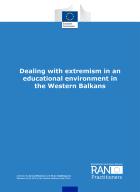Details
- Publication date
- 3 April 2023
- Author
- Directorate-General for Migration and Home Affairs
- RAN Publications Topic
- Formal/informal education
Description
The Western Balkans is a region that is still affected by the consequences of recent conflicts, and growing ethno-nationalist extremism. Young people often lack knowledge about “other” religions and ethno-national groups in their communities, which provides fertile ground for intolerance and animosity among members of various nationalities or religions. Furthermore, poor socio-economic conditions, high unemployment and low standard of living are also characteristics of the Western Balkans.
To top it all off, the COVID-19 pandemic has increased the risk of young people in the Western Balkans more susceptible to radicalisation due to factors such as the proliferation of conspiracy theories and misinformation, and social isolation. These are some of the biggest challenges faced by the school staff and young people in the Western Balkans that can contribute to young people accepting some of the radical and extremist narratives and messages they encounter both online and offline. In addition, sufficient institutional capacities in the education sector that would prevent violent extremism in the education sector are yet to be developed and so is a comprehensive strategy to deal with this problem. Education practitioners in the Western Balkan region need support and guidance to better understand their role and deal with extremism in school.
The objectives of this paper are to:
• highlight the significance of the education system and schools in dealing with radicalisation and violent extremism;
• provide general guidelines and practical tips for addressing students exposed to extremist ideologies in a school environment;
• present methods for handling sensitive topics related to violent extremism in the classroom;
• provide information on existing models that aim to foster critical thinking and positive dialogue between teachers and students, focusing on sensitive topics concerning violent extremism in the region.
The target audience for this paper is teachers and education professionals in schools (particularly secondary schools) in the Western Balkan region. At the beginning of the paper, we will examine the role of education and schools in recognising, preventing and dealing with violent extremism. It will focus on the key knowledge and information required by teachers to effectively deal with these topics in the classroom. We will also discuss how teachers should respond to the extremist narratives and provocations in the classroom and how they can deal with various sensitive and contentious topics related to violent extremism.
We will also present different types of extremist ideologies and various responses and pedagogical approaches. Teachers can provide these to students with a view to enhancing awareness and building resilience towards radicalisation. The effect of the COVID-19 pandemic and social media on youth radicalisation will also be discussed. The paper will provide recommendations and suggestions for school-wide initiatives to support P/CVE efforts, recognising that it not only the responsibility of individual teachers.
In the second part of the paper, existing approaches and methods for promoting critical thinking and constructive communication both from the European Union and the Western Balkans will be presented. These can serve as a foundation for further education and skill development of teachers in the Western Balkans.

